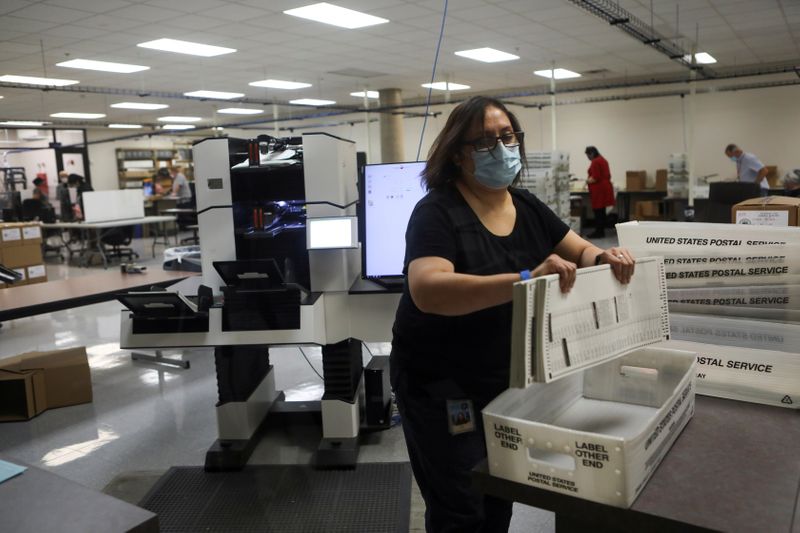Investing.com’s stocks of the week
By Brad Brooks
LAS VEGAS (Reuters) - The thin margins that separated U.S. President Donald Trump from Democratic rival Joe Biden in several swing states raised the question: Was the Republican incumbent hurt by the third-party run of Libertarian candidate Jo Jorgensen?
At midday Friday, the vote spreads between Biden and Trump in Georgia, Pennsylvania and Arizona were smaller than the number of votes Jorgensen won in those states. In Nevada and Wisconsin, Jorgensen's total plus the number who selected "none of the above" surpassed the gap.
Jorgensen said in a phone interview on Friday that Trump played the role of spoiler himself, pushing unhappy Republicans her way. She added that she heard from many disaffected Democrats on the campaign trail too.
"They were their own spoilers, by not following through on their campaign promises," Jorgensen said.
She had particular criticism for Trump, who she said sold himself in 2016 as "a political outsider who knew how to balance the budget and cut the deficit, and did neither."
Jorgensen blasted the political establishment for not allowing her to participate in presidential debates.
She argued that Libertarians draw on the best that both Republican and Democratic platforms have to offer - fiscal restraint on one hand, social liberty on the other. If a deeply divided electorate could have more exposure to that, more voters would have cast ballots for her, she said.
'WE DON'T KNOW'
It's tempting to assume Jorgensen's votes came at Trump's expense given past alliances between conservative Republicans and some Libertarians - not to mention the president recently said he considered himself "somewhat Libertarian."
But most analysts said that's simply not the case.
"We just don't know what would have happened if the Libertarians had not run a candidate," said David Boaz of the Cato Institute, who has authored books on the movement. "Libertarians also get votes of people who just would not bother voting if they didn't have another choice."
There is disagreement over which of the two main parties takes a bigger hit when a Libertarian is in the race. Boaz pointed to a 2016 CBS exit poll that showed that 25% of Libertarians who voted that year would have supported Democrat Hillary Clinton if there had been no Libertarian candidate. For Trump that figure was 15%, while 55% said they would have not voted.
Kenneth Mayer, a professor of American politics at the University of Wisconsin, said of Jorgenson: "It's possible she played a role, but there is no way to know and it doesn't matter. The results of the election are the results of the election," he said.
Mayer said rarely in American politics had a third party candidate made any difference. A notable exception was Ralph Nader's winning over 97,000 votes in Florida in the 2000 presidential election, when George W. Bush won the state by just 537 votes. If a third party candidate's votes dwarf the election margins for the winner, then it matters, he said.
And that, Mayer and Boaz said, was definitely not the case this year.
John Vaught LaBeaume, a Libertarian political strategist who worked on the 2016 campaign of Libertarian presidential candidate Gary Johnson, said most Libertarian voters simply would not vote for either a Democratic or Republican candidate.
Some Libertarian voters agree.
Morgan Thompson, a 39-year-old private detective in Waukesha, Wisconsin, said she eagerly voted for Jorgensen because of the "increased radicalization" of the two major parties.
If no Libertarian candidate had been on the Wisconsin ballot, Thompson said she would have submitted a blank ballot.
